|
Books Should Be Free Loyal Books Free Public Domain Audiobooks & eBook Downloads |
|
|
Books Should Be Free Loyal Books Free Public Domain Audiobooks & eBook Downloads |
|
Science |
|---|
|
Book type:
Sort by:
View by:
|
By: Edwin E. Slosson | |
|---|---|
 Creative Chemistry
Creative Chemistry
Slosson reviews the transformation of alchemistry from an obscure and imprecise practice to the science of chemistry. Along the way, he explains how the modern industrial world now relies on fertilizers, explosives, textile materials, polymers and metals.By exploring the properties of a once undervalued element, the high strength of vanadium steel made the Ford car possible. Another element, cerium, appears in butane lighters and was once seen as a threat to the match industry in France.In his chapter on oils, Slosson reviews the development of hydrogenated oils, especially during WWII, in the search for a way to reuse otherwise discarded components of corn and cottonseed... | |
By: Edwin L. Arnold | |
|---|---|
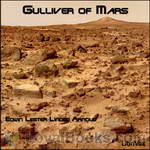 Gulliver of Mars
Gulliver of Mars
This escapist novel, first published in 1905 as Lieutenant Gullivar Jones: His Vacation, follows the exploits of American Navy Lieutenant Gulliver Jones, a bold, if slightly hapless, hero who is magically transported to Mars; where he almost outwits his enemies, almost gets the girl, and almost saves the day. Somewhat of a literary and chronological bridge between H.G. Wells and Edgar Rice Burroughs, Jones’ adventures provide an evocative mix of satire and sword-and-planet adventure. | |
By: Edwin Sharpe Grew (1867-1950) | |
|---|---|
 Romance of Modern Geology
Romance of Modern Geology
From the series, The Library of Romance, this book introduces the reader to the modern geology of the 1909, with topics that include the building and shaping of the earth, the action of weather, rivers, seas and ice on the earth, earthquakes and volcanoes, and, of course, dinosaurs and other extinct animals. - Summary by Ann Boulais | |
By: Elisha Gray (1835-1901) | |
|---|---|
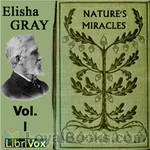 Nature's Miracles: Familiar Talks on Science
Nature's Miracles: Familiar Talks on Science
Elisha Gray (August 2, 1835 – January 21, 1901) was an American electrical engineer who co-founded the Western Electric Manufacturing Company. Gray is best known for his development of a telephone prototype in 1876 in Highland Park, Illinois and is considered by some writers to be the true inventor of the variable resistance telephone, despite losing out to Alexander Graham Bell for the telephone patent. | |
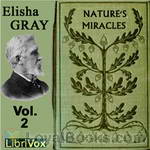 Nature's Miracles Volume II: Energy and Vibration
Nature's Miracles Volume II: Energy and Vibration
Elisha Gray was an American electrical engineer who co-founded the Western Electric Manufacturing Company. Gray is best known for his development of a telephone prototype in 1876 in Highland Park, Illinois and is considered by some writers to be the true inventor of the variable resistance telephone, despite losing out to Alexander Graham Bell for the telephone patent.Nature’s Miracles: Familiar Talks on Science, published in 1900, is a discussion of science and technology for the general public. Volume II is subtitled Energy and Vibration: Energy, Sound, Heat, Light, Explosives. | |
By: Eliza Burt Gamble (1841-1920) | |
|---|---|
 Sexes in Science and History
Sexes in Science and History
In this revised second edition of her first book "The evolution of woman" (1894), subtitled "An inquiry into the dogma of woman's inferiority to man", Eliza Burt Gamble uses Darwin's theory of evolution and other scientific information to compare the development of the male and female organisms and describe their differences. Introducing the role of the woman in prehistoric society, we see how that changed through the course of history, from evidence both in less advanced tribes and in civilized historic societies, to the marked progress in the social and economic conditions of women in the time this edition was published (1916). | |
By: Elizabeth Blackwell (1821-1910) | |
|---|---|
 Pioneer Work in Opening the Medical Profession to Women
Pioneer Work in Opening the Medical Profession to Women
A fascinating account of the first woman to receive a medical degree in the United States. She writes of her struggles in being accepted to a medical school . She details her experiences while in the process of obtaining her degree, and her work both with patients and administratively, helping to found medical schools and hospitals for women. Summary by Phyllis Vincelli | |
By: Elizabeth Grinnell (1851-1935) | |
|---|---|
 Our Feathered Friends
Our Feathered Friends
This volume displays the romance of birds in beautiful prose and dialog in simple language for children and adults alike. Written by a mother and son team of naturalists, chapters describe various aspects of the life and habits of birds highlighting specific birds from owls to hummingbirds. From the introduction: “Seek the children, little book: Bid them love the bird's retreat . . . Bid them find their secrets out, How to understand their words.” - Summary by Larry Wilson | |
By: Elizabeth L. Banks (1865-1938) | |
|---|---|
 Campaigns of Curiosity: Journalistic Adventures of an American Girl in London
Campaigns of Curiosity: Journalistic Adventures of an American Girl in London
Elizabeth Banks was an American journalist who, at about age 23, moved to London. While trying to break into English journalism and to keep the wolf from the door, she struck upon the idea of hiring out as a housemaid in some London household and writing about her experiences. Subsequently, she became a street sweeper, flower-seller, and a laundress. On the flip side, she advertised as an heiress and demonstrated how easy it was for a wealthy American to "buy a pedigree" and entry into the higher social circles... | |
By: Ella Rodman Church (1831-) | |
|---|---|
 Among the Trees at Elmridge
Among the Trees at Elmridge
"On that bright spring afternoon when three happy, interested children went off to the woods with their governess to take their first lesson in the study of wild flowers, they saw also some other things which made a fresh series of "Elmridge Talks," and these things were found among the trees of the roadside and forest." | |
By: Ellen Churchill Semple | |
|---|---|
 Influences of Geographic Environment
Influences of Geographic Environment
INFLUENCES OF GEOGRAPHIC ENVIRONMENT ON THE BASIS OF RATZEL'S SYSTEM OF ANTHROPO-GEOGRAPHY BY ELLEN CHURCHILL SEMPLE PREFACE The present book, as originally planned over seven years ago, was to be a simplified paraphrase or restatement of the principles embodied in Friedrich Ratzel's _Anthropo-Geographie_. The German work is difficult reading even for Germans. To most English and American students of geographic environment it is a closed book, a treasure-house bolted and barred. Ratzel himself realized that any English form could not be a literal translation, but must be adapted to the Anglo-Celtic and especially to the Anglo-American mind... | |
By: Ellen Key (1849-1926) | |
|---|---|
 Woman Movement
Woman Movement
Ellen Key's 'The Woman movement' follows the development of the feminist movement striving towards a greater emancipation of women in the public sphere and overcoming the traditional perception of gendered activities. The Swedish feminist and this work combined with many more, served as a base for a lot of the 20th century feminist movements. | |
By: Emanuel Swedenborg (1688-1772) | |
|---|---|
 Soul or Rational Psychology
Soul or Rational Psychology
Swedenborg, Emanuel, 1688-1772, was born in Stockholm, Sweden and died in London, England. He was a voluminous writer of scientific treatises as well as prophetic works such as Archana Caelestia and The Divine Providence. He said he had encountered supranational agencies and communicated with angels. This is a recording of the 1849 translation of his 1743 book The Soul or Rational Psychology Latin. He took his cue from Aristotle's De Anima. A few quotes It has been shown above that the harmonies... | |
By: Emma Goldman (1869-1940) | |
|---|---|
 Anarchism and Other Essays
Anarchism and Other Essays
Chicago, May 4, 1886. In the Haymarket region of the city, a peaceful Labor Day demonstration suddenly turns into a riot. The police intervene to maintain peace, but they soon use violence to quell the mob and a bomb is thrown, resulting in death and injuries to scores of people. In the widely publicized trial that followed, eight anarchists were condemned to death or life imprisonment, convicted of conspiracy, though none of them had actually thrown the bomb. A young Russian immigrant, Emma Goldman, had arrived just the previous year in the United States... | |
 Deportation: Its Meaning and Menace. Last Message to the People of America
Deportation: Its Meaning and Menace. Last Message to the People of America
A pamphlet written by Alexander Berkman and Emma Goldman shortly before their deportation from the US in 1919. | |
By: Ernest Shackleton | |
|---|---|
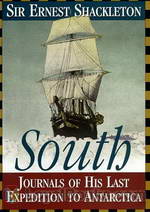 South! The Story of Shackleton's Last Expedition 1914-1917
South! The Story of Shackleton's Last Expedition 1914-1917
The expedition was given the grand title of The Imperial Trans-Antarctic Expedition. Due to be launched in 1914, two ships were to be employed. The first, the lead vessel, fittingly named the Endurance was to transport the team to the Weddell Sea from where the great explorer Ernest Shackleton and five others would cross the icy wastes of Antarctica on foot. The second ship, the Aurora was to approach the continent from the other side and put down supplies at various points to help the explorers... | |
By: Ernest Thompson Seton (1860-1946) | |
|---|---|
 Wild Animals I Have Known
Wild Animals I Have Known
Wild Animals I Have Known is an 1898 book by naturalist and author Ernest Thompson Seton. The first entry in a new genre of realistic wild-animal fiction, Seton's first collection of short stories quickly became one of the most popular books of its day. "Lobo the King of Currumpaw", the first story in the collection, was based upon Seton's experience hunting wolves in the southwestern United States. It became a classic, setting the tone for his future works that would similarly depict animals—especially predators who were often demonized in literature—as compassionate, individualistic beings. | |
By: Eva March Tappan (1854-1930) | |
|---|---|
 World’s Story Volume XIII: The United States
World’s Story Volume XIII: The United States
This is the thirteenth volume of the 15-volume series of The World’s Story: a history of the World in story, song and art, edited by Eva March Tappan. Each book is a compilation of selections from prose literature, poetry and pictures and offers a comprehensive presentation of the world's history, art and culture, from the early times till the beginning of the 20th century. Part XIII is the second volume of the history of the United States, exploring topics from the Civil War, the settlement on the West Coast, and new scientific discoveries from the 19th and early 20th centuries. - Summary by Sonia | |
By: F. J. Foakes-Jackson (1855-1941) | |
|---|---|
 Social Life in England 1750-1850
Social Life in England 1750-1850
In 1916, the Cambridge historian, F.J. Foakes-Jackson braved the wartime Atlantic to deliver the Lowell Lectures in Boston. In these wide-ranging and engaging talks, the author describes British life between 1750-1850. There are John Wesley's horseback peregrinations over thousands of miles of English countryside. Next, Foakes-Jackson introduces the mordant rural poet, George Crabbe, who began life as a surgeon apothecary and ended up as a parish rector who made house calls. He gives us a female convict, assorted Cambridge University dons, Regency fops and rakes, and Victorian slices of life from Dickens and Thackeray... | |
By: Fabian Franklin | |
|---|---|
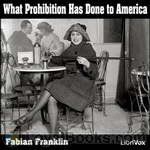 What Prohibition Has Done to America
What Prohibition Has Done to America
In What Prohibition Has Done to America, Fabian Franklin presents a concise but forceful argument against the Eighteenth Amendment of the U.S. Constitution. Beginning in 1920, this Amendment prohibited the sale and manufacture of alcoholic beverages in the United States, until it was repealed in 1933. Franklin contends that the Amendment “is not only a crime against the Constitution of the United States, and not only a crime against the whole spirit of our Federal system, but a crime against the first principles of rational government... | |
By: Fannie Hardy Eckstorm (1865-1946) | |
|---|---|
 The Woodpeckers
The Woodpeckers
The Woodpeckers is a wonderful introduction to the world of bird study for the young naturalist, covering such topics as how he finds food, courting, how he builds his nest, the interesting ways he uses his different body parts as tools, among other topics discussed in the book. If you wish to investigate further, the book has a few diagrams and an Appendix that contains more technical information such as detailed descriptions of the different species of North American woodpeckers which were not read as part of this audiobook. | |
By: Fleming Mant Sandwith (1853-1918) | |
|---|---|
 Sleeping Sickness
Sleeping Sickness
In the twenty-first century sleeping sickness is still a life-threatening disease of adults and children and a hazard to tourists in East African game parks.The protozoan parasite is transmitted by the tsetse fly, a buzzing insect with reddish eyes and a large biting proboscis. In 1912, when this short monograph was written, physicians of the British Empire understood that trans-continental expeditions manned by infected African porters, had set off an epidemic of sleeping sickness that had claimed half a million lives... | |
By: Florence Nightingale (1820-1910) | |
|---|---|
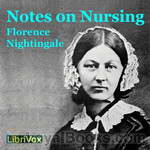 Notes on Nursing
Notes on Nursing
Notes on Nursing was published in 1859 and is a fascinating view into the theories underpinning the early development of modern nursing and public health reform by "the Lady with the Lamp", Florence Nightingale. Emphasising common sense and thought for the patient's care in many more ways than just administering physician-prescribed medicines, this is still a very relevant book for those interested in health or caring for the sick and infirm today.Summary by Cori Samuel. | |
By: Ford Madox Ford (1873-1939) | |
|---|---|
 Soul of London
Soul of London
'Most of us love places very much as we may love what, for us, are the distinguished men of our social lives. [...] We are, all of us who are Londoners, paying visits of greater or less duration to a Personality that, whether we love it or very cordially hate it, fascinates us all. And, paying my visit, I have desired to give some such record. I have tried to make it anything rather than encyclopaedic, topographical, or archaeological. To use a phrase of literary slang I have tried to "get the atmosphere" of modern London -- of the town in which I have passed so many days; of the immense place that has been the background for so many momentous happenings to so many of my fellows.' | |
By: Frances Swain | |
|---|---|
 Food Guide for War Service at Home
Food Guide for War Service at Home
"The long war has brought hunger to Europe; some of her peoples stand constantly face to face with starvation. To meet all this great food need in Europe—and meeting it is an imperative military necessity—we must be very careful and economical in our food use here at home. We must eat less; we must waste nothing; we must equalize the distribution of what food we may retain for ourselves; we must prevent extortion and profiteering which make prices so high that the poor cannot buy the food they actually need; and we must try to produce more food... | |
By: Francis Bacon (1561-1626) | |
|---|---|
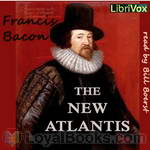 The New Atlantis
The New Atlantis
In 1623, Francis Bacon expressed his aspirations and ideas in New Atlantis. Released in 1627, this was his creation of an ideal land where people were kind, knowledgeable, and civic-minded. Part of this new land was his perfect college, a vision for our modern research universities. Islands he had visited may have served as models for his ideas. | |
By: Francis M. Walters | |
|---|---|
 Physiology and Hygiene
Physiology and Hygiene
Physiology and Hygiene for Secondary Schoolsby Francis M. Walters, A.M.PREFACE The aim in the preparation of this treatise on the human body has been, first, to set forth in a teachable manner the actual science of physiology; and second, to present the facts of hygiene largely as applied physiology. The view is held that right living consists in the harmonious adjustment of one's habits to the nature and plan of the body, and that the best preparation for such living is a correct understanding of the physical self... | |
By: Francis Rolt-Wheeler (1876-1960) | |
|---|---|
 Science - History of the Universe Vol. 6: Zoology & Botany
Science - History of the Universe Vol. 6: Zoology & Botany
Multi-volume work on science edited by Francis Rolt-Wheeler. The sixth volume is on Zoology written by Dr. WM. D. Matthew and on Botany written by Marion E. Latham. The section on Zoology examines the development, evolution and distribution of animals. It further discusses types of animals - invertebrates and vertebrates. The section on botany touched on early development of botany and delved on structures and reproduction of plants. Development of the study of morphology and plant cell anatomy and variations were also examined. | |
 Science - History of the Universe Vol. 7: Anthropology & Medicine
Science - History of the Universe Vol. 7: Anthropology & Medicine
Multi-volume work on science edited by Francis Rolt-Wheeler. The seventh volume is on Anthropology written by the editor himself and on Medicine written by Theodore H. Allen. An introduction to the Anthropology section was written by Frederick Starr. The section on Anthropology discusses its role in science, explains different human races, delved into prehistoric archaeology and further into the development of culture. The section on Medicine goes through medical knowledge from the ancients, Greeks, Romans, Arabians and all the way to the 17th to 19th century. It examined how these different eras affected the progress of medicine. - Summary by Sienna | |
 Science - History of the Universe Vol. 8: Mathematics
Science - History of the Universe Vol. 8: Mathematics
Multi-volume work on science edited by Francis Rolt-Wheeler. The eighth volume is on Pure Mathematics written by L. Leland Locke and on Mathematical Applications written by Dr. Franz Bellinger. An introduction was written by Professor Cassius J. Keyser with a special section on the Foundation of Mathematics. The Pure Mathematics section discusses numbers - its conception and calculations, as well as different areas of mathematics - algebra, geometry, trigonometry. The last section goes into the different applications of mathematics. - Summary by Sienna | |
 Science - History of the Universe Vol. 3: Physics & Electricity
Science - History of the Universe Vol. 3: Physics & Electricity
Multi-volume work on science edited by Francis Rolt-Wheeler. The third volume is on physics written by George Matthew and on electricity written by Professor William J. Moore. The section on physics covers matter - analysis and properties, heat, light - its sources and its nature, and sound. On the subject of electricity, it discusses the nature of electricity, electrostatics, fundamental discoveries in electric science and how electro-chemistry was developed and electromagnetic machines. It also details technologies advanced by discovery of electricity and electromagnetism such as electric lighting, the telephone, electric railway, telegraph and wireless telegraphy... | |
 Science - History of the Universe Vol. 1: Astronomy
Science - History of the Universe Vol. 1: Astronomy
Multi-volume work on science edited by Francis Rolt-Wheeler. The first volume is on Astronomy written by Waldemar Kaempffert. This book briefly discusses the evolution of astronomical beliefs and the development of instruments and progress of methods in the science. It explains, further, the different astronomical laws, theories, phenomena and objects, as well as the history of these discoveries. | |